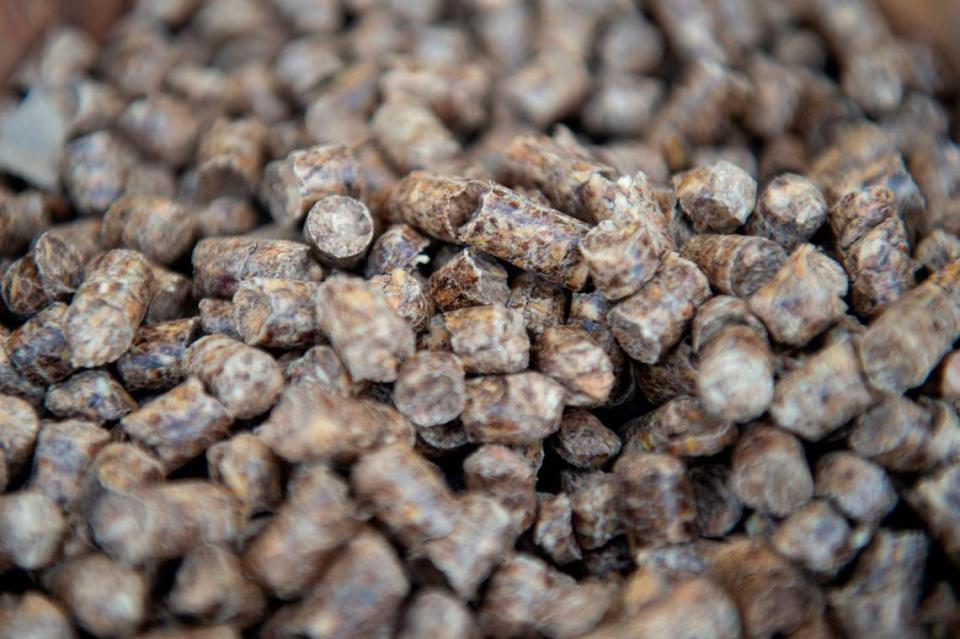After declaring bankruptcy, are Enviva sites closing in South MS? Here’s what we know
Reality Check is a Sun Herald series holding those in power to account and shining a light on their decisions. Have a suggestion for a future story? Email mynews@sunherald.com.
Although Enviva Inc. and subsidiaries have filed for Chapter 11 bankruptcy, the wood-pellet manufacturer is exceeding its requirement to create 110 jobs in George and Jackson counties in exchange for $4 million in state and local assistance, the Mississippi Development Authority says.
Enviva reports a total of 126 full-time jobs at its George County plant and its export terminal at the Port of Pascagoula, said Tammy Craft, MDA public relations bureau manager. Of the total, 97 jobs are at the George County plant, which opened in 2022.
The parent company and three Mississippi subsidiaries are among the Enviva entities that filed for Chapter 11 bankruptcy on March 13. Those subsidiaries include Enviva Pellets Lucedale LLC, which operates the George County plant, Enviva Port of Pascagoula LLC, which ships wood chips from a company terminal at the port, and Enviva Pellets Bond LLC in Stone County, where a third wood-chip manufacturing plant has been put on hold.
Enviva’s oldest plant operated in the United States, acquired in 2010, is in Amory, Mississippi, and is not listed among the subsidiaries filing for bankruptcy.
Operations are continuing uninterrupted at Enviva Pellets Lucedale as the company works to restructure its debt. That debt includes more than $101 million in bonds issued for the Stone County plant, according to Enviva’s bankruptcy filing.
A company news release says Enviva hopes the restructuring will lower its debt by $1 billion and “improve profitability, strengthen liquidity, and better position the business for long-term success as the world’s largest producer of industrial wood pellets.”
Enviva had about $1.8 billion in outstanding debt when it filed for bankruptcy, according to Fitch Ratings.
Enviva representatives did not respond to emails from the Sun Herald about its plans in Mississippi.

Enviva operations steady in George, Jackson counties
Enviva manufactures would pellets in George County, where trucks bring in raw material and trains help deliver wood chips to the company export terminal at the Port of Pascagoula.
“The trains are running, the trucks are running and I know they’ve exceeded their job requirements in Lucedale,” said George Freeland, executive director of the Jackson County Economic Development Foundation. “Everything seems built for cautious optimism.”
Enviva must maintain its job numbers in George and Jackson counties for a total of five years or face repayment of grant funds, according to an agreement between the company, MDA, George County and others.
MDA’s Craft said the agency had approved $2 million in assistance for Enviva’s Stone County plant but the money has not been disbursed. Enviva says that project is on hold because of the bankruptcy. Stone County officials are awaiting “official word” from the company about its plans, said Layla Essary, interim director of the Stone County Economic Development Partnership.
Enviva converts wood to pellets sold as biofuel in overseas markets. Most of the pellets manufactured in George County are sold in Japan, said George County Economic Development Director Ken Flanagan. He said the company has 14 years left on a contract for sales in Japan.
“We’re cautiously optimistic that our plant’s going to make it,” Flanagan said. “We’re closely monitoring it. There is a real sense of confidence that this plant, the third highest-producing in Enviva’s entire fleet, is reaching its peak efficiency.”

Indirect jobs, business activity add value
In addition to jobs at the plant, Flanagan estimates Enviva’s operation has led to another 100 indirect jobs for truckers, wood chippers and haulers.
Small-engine repair shops and other mechanics also are seeing increased business, he said. Although Enviva might not be entirely responsible, Flanagan said three restaurants have opened downtown since Enviva started operations in 2022.
The business growth is welcomed, especially because George County gave Enviva a $13 million property tax break over 10 years.
Enviva paid $1 million in property taxes for 2023 on a plant the county values at $165 million. Flanagan said residential property tax collections were up 20% or more for the year.
The Enviva project also received almost $2.5 million from the Gulf Coast Restoration Fund that went to road and rail improvements in the George County Industrial Park and for rail service into the Port of Pascagoula.
When it was built, the plant was hailed as George County’s largest industrial development project in 30 years. It is also Enviva’s newest plant, Flanagan said.
The company is not without its critics, who claim Enviva is destroying forests and polluting the environment, while Enviva touts its production of renewable energy and says it replants trees.
“This company could not have existed without massive subsidies,” the North Carolina-based Dogwood Alliiance said in a news release about the bankruptcy. “They’ve received subsidies at the international, federal, state, and local level. That money could have gone to clean energy, green jobs, and forest protection.”

